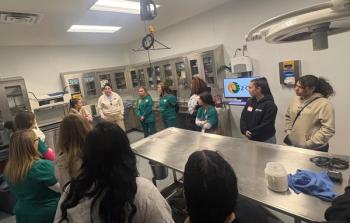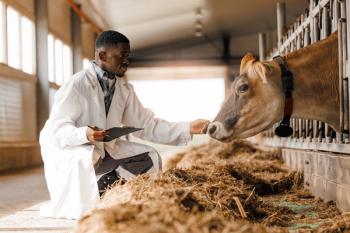
KSU researchers probe depression rates of veterinary students and medical students
Manhattan, Kan. -- Veterinary medical students are more likely to struggle with depression than their human medicine counterparts, according to new research from Kansas State University.
Manhattan, Kan. —
Veterinary medical students are more likely to struggle with depression than their human medicine counterparts, according to new research from Kansas State University.
Mac Hafen, therapist and clinical instructor in KSU’s College of Veterinary Medicine, along with other researchers from KSU, the University of Nebraska and East Carolina University collaborated on several studies examining depression and anxiety in veterinary students.
Historically, similar research has been performed on human medicine students, or on pet owners, but not on veterinarians or veterinary students, according to KSU.
"We are hoping to predict what contributes to depression levels so that we can intervene and make things run a little bit more smoothly for students themselves," says Hafen, who has spent five years researching the well-being and mental health of veterinary students.
Researchers anonymously surveyed veterinary students at various levels of the DVM program once a semester. They found that, during the first year of veterinary school, 32 percent of the veterinary students showed symptoms of depression, compared to 23 percent of human medical students.
Additionally, veterinary students experience higher depression rates as early as the first semester of their first year of study, according to KSU's report. Depression rates appear to increase even more during the second and third year of school, but then drop down to first-year levels during the fourth year.
Why? Veterinarians deal with stressors that their human medicine counterparts do not, Hafen says, like euthanasia. Veterinary students may also face higher rates of depression because of the intensity of the programs.
While veterinary and human medical programs are demanding, veterinarians are asked to understand a variety of species, not just one. Balancing work, life and school also play a role with depression rates, Hafen says.He also speculates that the differences between the two professions could be, at least somewhat, based on gender.
While medical schools are nearly split evenly between male and female students, the majority veterinary medical students are female. National studies indicate that women are two to three times more likely than men to suffer from mood disorders, KSU says.
Other feelings contributing to depression included homesickness, not fitting in, worries about academic performance and concerns about physical health. The research identified some ways veterinary school faculty could help students struggling with depression and anxiety, like having clear expectations of students, sponsoring events that help improve physical health, and empathizing with students and their concerns about their studies.
"The hope is that we can identify some ways to help alleviate some of the depression and the symptoms of depression and anxiety that might be occurring," Hafen says.
Two articles on this research have been published in the
Journal of Veterinary Medicine Education
, and the research team is in the process of preparing another for publication.
Newsletter
From exam room tips to practice management insights, get trusted veterinary news delivered straight to your inbox—subscribe to dvm360.






